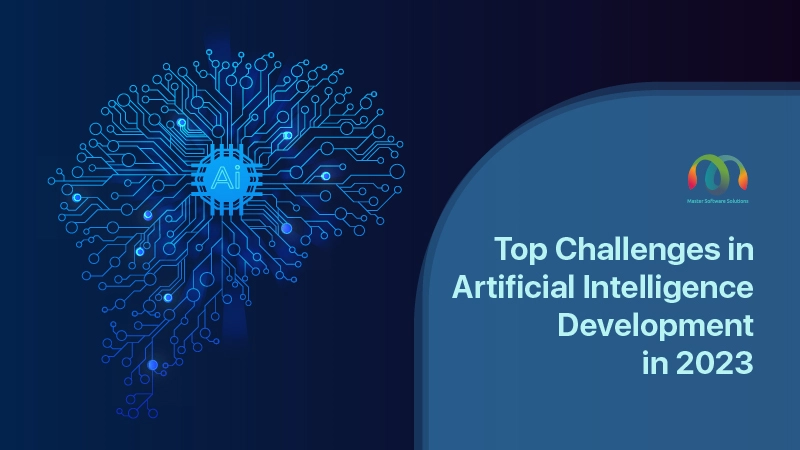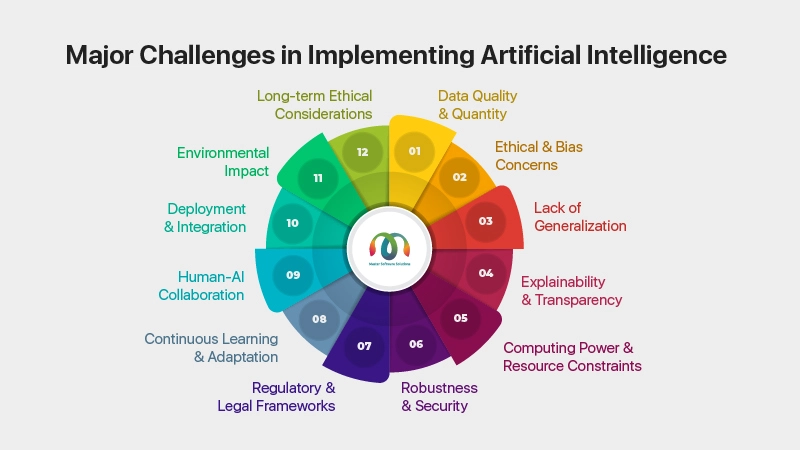Top Challenges in Artificial Intelligence Development in 2023

Artificial intelligence (AI) has emerged as a transformative technology with the potential to revolutionise industries, automate tasks, and improve decision-making processes. AI has come a long way already, with applications ranging from virtual personal assistants to self-driving cars. AI has reframed many sectors, including healthcare, banking, insurance, and life science. However, there are many difficult obstacles in the way of realising AI’s full potential.
In this blog, we’ll explore some of the major challenges in artificial intelligence development.
Major challenges in artificial intelligence development
Data quality and quantity – Data is a critical component of how AI systems learn and predict answers. The quality and amount of data that is currently available is one of the most important challenges. To effectively train AI models, there may not be enough pertinent data. Additionally, the data used may be incomplete, inaccurate, or biased, resulting in biased AI systems and false conclusions.
Ethical and bias concerns – Bias in AI algorithms is a significant concern. If the training data used is biased, AI systems can perpetuate or amplify existing biases. This can lead to discriminatory outcomes in areas such as hiring, lending, and law enforcement. Ensuring that AI systems are fair and ethical is a complex challenge that requires careful consideration of data, algorithms, and decision-making processes.
Lack of generalization – Many artificial intelligence (AI) models are built for specific tasks, so they may have trouble applying what they have learned to brand-new, uncharted territory. Researchers and developers are actively working to overcome the challenge of achieving generalisation, where AI systems can use knowledge learned in one context to solve problems in another.
Explainability and transparency – Deep learning algorithms in particular are frequently referred to as “black boxes” because of the lack of clear explanations of how they arrived at their conclusions. Concerns are raised by this lack of transparency, particularly in industries with high stakes like healthcare and finance, where it is critical to understand the logic behind AI decisions.
Computing power and resource constraints – Deep neural networks, for example, need a lot of computing power and resources to be trained. Smaller businesses or those operating in environments with limited resources may face difficulties as a result of this. It is a continuous challenge to create AI solutions that are effective and efficient on constrained hardware.
Robustness and Security – AI systems are susceptible to adversarial attacks, in which minute, skillfully designed adjustments to the input data result in inaccurate predictions. It is a significant challenge to guarantee the security and robustness of AI models against these types of attacks.
Regulatory and Legal Frameworks – The emergence of legislative and regulatory frameworks to control its application has lagged behind the quick development of AI technology. The ethical and legal ramifications of artificial intelligence, such as those pertaining to liability, privacy, and intellectual property, are difficult for policymakers to keep up with.
Continuous Learning and Adaptation – To remain effective as new data and scenarios emerge, AI systems typically need to be continuously learning and adapting. It is a difficult task to make sure AI systems can adapt and get better over time, especially in applications where reliability and safety are crucial.
Human-AI collaboration – Effective collaboration between people and AI systems is becoming increasingly important as AI is incorporated into more sectors of the economy. The challenge of creating user interfaces and workflows that enable natural communication between humans and AI is complex.
Deployment and integration – It can be challenging to integrate artificial intelligence (AI) into current systems and processes. Many businesses have difficulty implementing AI solutions due to issues with user adoption and compatibility with legacy systems.
Environmental impact – Large AI models require computational demands that use up a lot of energy. In light of concerns about climate change, addressing the environmental impact of AI development and use is a growing challenge.
Long-term ethical considerations – Artificial intelligence (AI) has the potential to fundamentally alter society, prompting long-term ethical concerns about the effects on employment, social equality, and human autonomy. It is a constant challenge to strike a balance between ethical considerations and technological advancement.
There are enormous potential advantages of AI, however, challenges in AI development make it difficult to achieve. Your business must hire reputable AI development service providers. At Master Software Solutions, we bring expertise and innovation to the table.
Let’s understand how developing an effective AI helps your business.
How can AI help businesses in the coming years?
Artificial intelligence (AI) has the potential to significantly influence how businesses in a variety of industries operate in the future. Here are several ways AI can help businesses in the coming years:
Enhanced Customer Experiences – Artificial intelligence-powered chatbots and virtual assistants can offer round-the-clock customer service, respond to questions, and carry out repetitive tasks, enhancing customer satisfaction.
Personalization – Artificial intelligence (AI) analyses enormous amounts of data to comprehend customer preferences and behaviour, enabling businesses to provide personalised product recommendations, content, and marketing campaigns, increasing conversion rates and client loyalty.
Data Analytics – Businesses can extract useful insights from their data using AI-driven analytics, which also helps them identify trends, forecast future events, and make data-driven decisions that increase productivity and competitiveness.
Automation – Artificial intelligence (AI) automates time-consuming and repetitive tasks, lowering operational costs and freeing up human resources for more strategic and innovative work.
Supply Chain Optimization – By forecasting demand, enhancing inventory management, and enhancing logistics, artificial intelligence (AI) optimises supply chain operations, leading to cost savings and improved customer service.
Predictive Maintenance – AI-driven predictive maintenance can foresee equipment failures in manufacturing and other sectors dependent on machinery, minimising downtime and cutting maintenance costs.
Fraud Detection – AI algorithms examine transaction data in real-time to spot fraudulent activity, protecting businesses from losses in revenue and harm to their reputations.
Healthcare Advancements – Improved patient care and the creation of novel treatments are the results of AI’s assistance in disease diagnosis, medical image analysis, and drug discovery.
Natural Language Processing (NLP) – Businesses can automate content creation, sentiment analysis, and language translation thanks to AI-powered NLP applications, which enhance communication and content creation.
Human resource – By conducting initial interviews, reviewing resumes, and selecting the best candidates, human resources AI streamlines the hiring process, reducing hiring time and increasing hiring effectiveness.
Energy Efficiency – AI enables businesses to reduce energy costs and environmental impact by analysing usage patterns and making system adjustments as necessary.
Market Forecasting – AI algorithms examine news, social media sentiment, and market data to give businesses accurate market trend insights that aid in making wise investment decisions.
Content Recommendations – Streaming services and e-commerce sites use AI to suggest goods and content based on the preferences of particular users, increasing engagement and revenue.
Cybersecurity – AI improves cybersecurity by quickly spotting and countering threats, safeguarding confidential information, and ensuring business continuity.
Compliance and Risk Management – AI helps businesses monitor regulatory compliance and risk assessment, preventing legal problems and monetary penalties.
Remote Work Productivity – AI-powered tools make it easier to work remotely by offering platforms for collaboration, automating administrative tasks, and enhancing remote communication.
Environmental Sustainability – AI helps with waste reduction and resource allocation optimisation, which supports sustainable business practices.
As AI becomes more and more integrated into daily operations, its impact on business will grow over the next few years. Businesses should invest in artificial intelligence development to stay competitive, adapt to changing AI trends, and use AI to spur growth, efficiency, and innovation. Book a meeting to discuss your business plan and see how we can help you grow.
